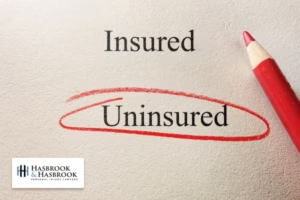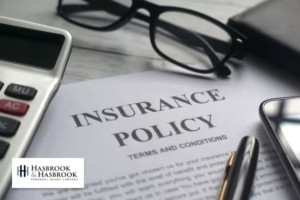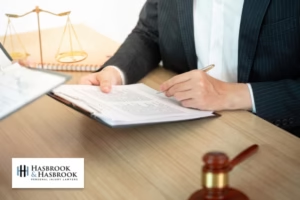 Imagine you’re in a car accident, and the other driver is at fault, but they only have the minimum required insurance. Unfortunately, their coverage is far less than what is needed to cover your total damages. This is where underinsured motorist coverage (UIM) becomes essential. UIM helps when the at-fault driver’s insurance limits are insufficient. If you’ve been in a car accident caused by an uninsured driver, UIM coverage allows you to claim additional compensation from your own insurance policy. At Hasbrook & Hasbrook, we specialize in UIM claims and work hard to help you recover the compensation you deserve.
Imagine you’re in a car accident, and the other driver is at fault, but they only have the minimum required insurance. Unfortunately, their coverage is far less than what is needed to cover your total damages. This is where underinsured motorist coverage (UIM) becomes essential. UIM helps when the at-fault driver’s insurance limits are insufficient. If you’ve been in a car accident caused by an uninsured driver, UIM coverage allows you to claim additional compensation from your own insurance policy. At Hasbrook & Hasbrook, we specialize in UIM claims and work hard to help you recover the compensation you deserve.
What is an Underinsured Motorist (UIM) Claim?
A UIM claim is made when the driver responsible for your accident doesn’t have enough insurance coverage to pay for all your injuries and damages. Even if the other driver has liability insurance, their policy limits may not cover the full extent of your medical expenses, vehicle repairs, or property damage. That’s when your own personal injury protection (PIP) or UIM coverage kicks in, helping to cover the gap. At Hasbrook & Hasbrook, we guide you through the process of filing an insurance claim to get the full compensation you deserve.
The Definition of “Underinsured”
An underinsured driver is someone who has car insurance, but their coverage is too low to cover the full cost of an accident. For example, if the at-fault driver’s insurance covers only $25,000, but your total medical attention, vehicle damage, and other costs exceed that, the driver is considered underinsured. In this case, your uninsured motorist coverage can help make up the difference, ensuring you aren’t left with out-of-pocket costs.
How UIM Coverage Protects You
UIM coverage is a part of your car insurance policy that provides additional protection when the other driver is underinsured. If you’re involved in an accident caused by an underinsured driver, your UIM coverage can help pay for medical bills, lost wages, pain and suffering, and property damage that the at-fault driver’s insurance cannot cover. This protection can help ensure that you don’t bear the financial burden caused by an accident that wasn’t your fault.
UIM vs. Uninsured Motorist (UM) Coverage
 Understanding the difference between UIM and UM coverage is crucial. Both coverages are vital, but they protect you in different situations. Knowing when each coverage applies can ensure that you’re fully protected in case of an accident.
Understanding the difference between UIM and UM coverage is crucial. Both coverages are vital, but they protect you in different situations. Knowing when each coverage applies can ensure that you’re fully protected in case of an accident.
Key Differences in Driver Insurance Status
- UM coverage applies if the other driver is completely uninsured.
- UIM coverage applies if the at-fault driver has some insurance but not enough to cover your damages.
Having both types of coverage is crucial for your protection. UM coverage helps when there’s no insurance, and UIM coverage helps when the other driver’s policy is too low.
Why Both Coverages Are Essential
Having both UIM and UM coverage is essential for full financial protection. UM coverage protects you if the other driver has no insurance, while UIM coverage covers the shortfall if their insurance is inadequate. These coverages help cover medical bills, property damage, and lost wages, giving you peace of mind that you’ll be protected in both scenarios. At Hasbrook & Hasbrook, we recommend having both coverages for maximum protection against negligent drivers.
The Step-by-Step UIM Claims Process
Filing a UIM claim against an underinsured driver requires a specific process to ensure you receive the full compensation you deserve. A UIM claim can be complex, but it’s necessary when the at-fault driver lacks enough auto insurance to cover your damages. This process involves working with your insurance company and may require negotiating a fair settlement. At Hasbrook & Hasbrook, our car accident lawyers are here to guide you through each step of the process and fight for your full recovery.
Step 1: Exhausting the At-Fault Driver’s Policy
The first step is to exhaust the at-fault driver’s liability coverage. If their insurance coverage isn’t enough to cover your damages, you must first file a claim with their insurance company. Once their policy limits are used up, you can proceed with filing a UIM claim with your own insurer. This is essential to establish how much compensation you can seek through your personal injury protection (PIP) or uninsured motorist coverage.
Step 2: Notifying Your Own Insurance Company
After exhausting the at-fault driver’s policy, notify your insurance company about the accident and your need for a UIM claim. Your insurer will review the details of the accident, including medical attention records, vehicle damage, and other documents. It’s important to inform your insurance company as soon as possible to avoid delays in processing your claim. At Hasbrook & Hasbrook, we help ensure all necessary information is provided to your insurer to support your claim.
Step 3: The UIM Claim Investigation
Once your insurance company is notified, it will begin investigating your UIM claim. The investigation typically includes reviewing medical records, property damage liability, and accident reports. Insurance adjusters will assess your claim based on the severity of your injuries and the costs associated with your damages. With the help of accident reconstruction experts, we ensure that your insurance settlement offer is fair and accurate. Having an experienced car accident attorney from Hasbrook & Hasbrook on your side ensures the process is handled professionally and that your rights are protected.
Navigating Negotiations with Your Own Insurer
 When filing a UIM claim, you’re negotiating with your own insurance company. While they have a duty to act in good faith, they are still businesses trying to minimize payouts. This may result in lowball offers or delays in processing. At Hasbrook & Hasbrook, we work on your behalf to ensure fair compensation for your damages.
When filing a UIM claim, you’re negotiating with your own insurance company. While they have a duty to act in good faith, they are still businesses trying to minimize payouts. This may result in lowball offers or delays in processing. At Hasbrook & Hasbrook, we work on your behalf to ensure fair compensation for your damages.
- The Duty of Good Faith and Fair Dealing: Insurers are legally required to handle claims honestly and promptly. However, they often try to reduce payouts. If your insurer is not acting in good faith, we will protect your rights and fight for a fair settlement.
- Strategies for Countering Lowball Offers: If the settlement offer is too low, it’s essential to counter with solid evidence. This includes medical bills, lost wages, and property damage estimates. Expert testimony can also help strengthen your claim. We help you secure the fair compensation you deserve.
Documenting Your Damages for a UIM Claim
Proper documentation is crucial in proving that your damages exceed the at-fault driver’s insurance limits. The more detailed and organized your documentation, the stronger your claim will be.
- Proving Economic Losses (Medical Bills, Lost Wages): Document medical bills, lost wages, and other costs from the accident. Keep all receipts and medical records to support your claim. These documents will help your insurer assess your damages.
- Validating Non-Economic Damages (Pain and Suffering): Non-economic damages like pain and suffering can be difficult to quantify. Keeping a journal, medical records, and testimony from family and friends can help validate these claims. At Hasbrook & Hasbrook, we help gather the necessary evidence to support all your damages.
Common Challenges in UIM Claims
 Filing a UIM claim against your own insurance policy can involve specific challenges. Issues like policy limit disputes and bad faith tactics can complicate the process. At Hasbrook & Hasbrook, we help clients navigate these challenges to ensure they receive the compensation they deserve.
Filing a UIM claim against your own insurance policy can involve specific challenges. Issues like policy limit disputes and bad faith tactics can complicate the process. At Hasbrook & Hasbrook, we help clients navigate these challenges to ensure they receive the compensation they deserve.
- Policy Limit Disputes and Stacking Coverage: Disputes over how much your insurance will pay may arise. Some insurers limit payouts even when damages exceed the at-fault driver’s coverage. Stacking multiple policies to increase the payout might help, but not all policies allow it.
- Dealing with Insurance Bad Faith Tactics: Insurers are required to act in good faith, but some may delay claims or offer unfair settlements. If your insurer isn’t cooperating, we can help protect your rights and ensure a fair resolution.
When to Consider Legal Action: Arbitration and Lawsuits
If your insurance company isn’t offering a fair settlement, you may need to consider arbitration or even file a lawsuit against them. Arbitration is often required by your policy, but if you cannot reach a fair settlement, a lawsuit may be the next step. At Hasbrook & Hasbrook, we help you decide the best course of action and ensure your rights are protected.
- Understanding Arbitration Clauses: Many insurance policies require arbitration for disputes. While it can be quicker than a lawsuit, arbitration limits your ability to appeal.
- Filing a Bad Faith Insurance Lawsuit: If your insurer isn’t handling your claim fairly, a bad faith lawsuit may be necessary. We can help you pursue this action to hold your insurer accountable.
Why You Need an Attorney for a UIM Claim
 Negotiating with your own insurer can be challenging, especially when they are focused on minimizing payouts. Having a personal injury attorney is essential to ensure that you receive fair compensation. We work with you to ensure that all your damages, including medical bills and lost wages, are fully covered.
Negotiating with your own insurer can be challenging, especially when they are focused on minimizing payouts. Having a personal injury attorney is essential to ensure that you receive fair compensation. We work with you to ensure that all your damages, including medical bills and lost wages, are fully covered.
- Leveling the Playing Field Against an Insurance Company: Insurance companies often try to offer low settlements. We can help level the playing field by fighting for your rights and securing the compensation you deserve.
- Maximizing Your Total Financial Recovery: We ensure that you get the maximum recovery for both economic and non-economic damages. Our goal is to help you recover fully, both financially and emotionally.
Frequently Asked Questions (FAQs)
Do I have to pay a deductible for a UIM claim?
Typically, no. UIM claims usually do not have a deductible, unlike a collision claim.
Will filing a UIM claim cause my premiums to increase?
It should not, as you are not at fault. However, rate changes vary by insurer and state law.
What if my UIM limits are too low to cover my damages?
If your damages exceed all available policies, you may explore a personal injury lawsuit against the at-fault driver directly.
How long does the UIM claims process take?
It often takes longer than a standard claim due to the need to first settle with the at-fault driver’s insurer.
Is UIM coverage required in Oklahoma?
Insurers must offer it, but you can reject it in writing. It is highly recommended to carry it.
How can Hasbrook & Hasbrook help with my UIM claim?
We handle all negotiations, protect you from bad faith tactics, and fight to secure the full UIM benefits you paid for.
Contact Our Personal Injury Attorney for Your UIM Claim
 Dealing with an underinsured driver is frustrating, but your own policy is there to help. At Hasbrook & Hasbrook, we ensure that the claims process is handled correctly and that you receive the maximum compensation possible. Contact us for a free consultation to review your policy and discuss your UIM claim.
Dealing with an underinsured driver is frustrating, but your own policy is there to help. At Hasbrook & Hasbrook, we ensure that the claims process is handled correctly and that you receive the maximum compensation possible. Contact us for a free consultation to review your policy and discuss your UIM claim.











